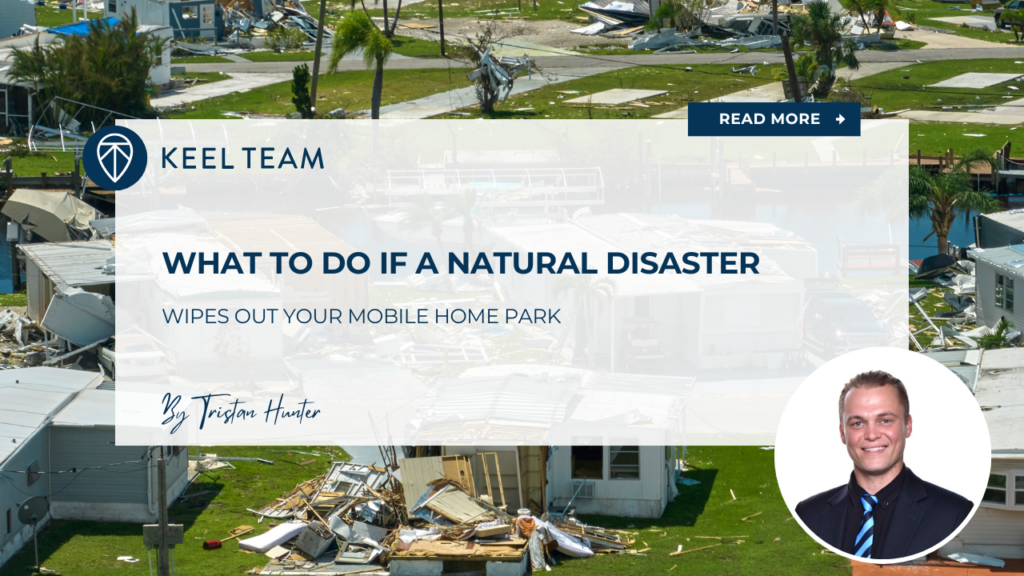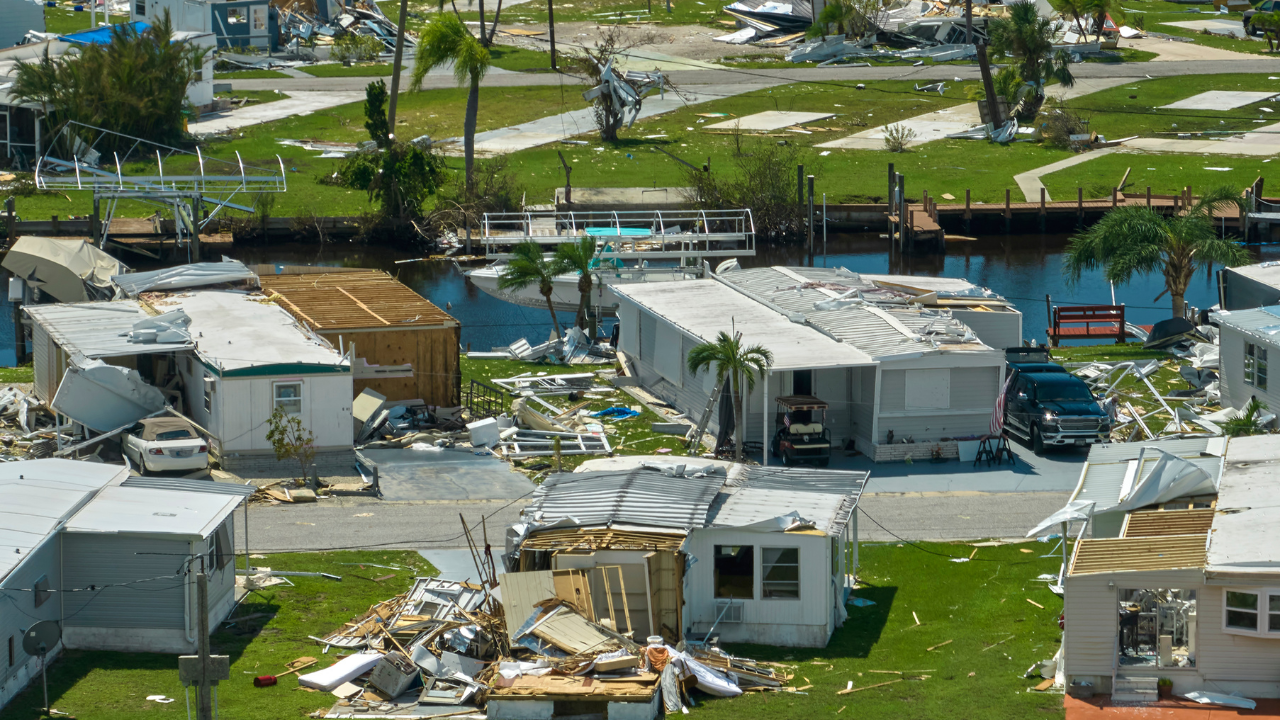What to Do If a Natural Disaster Wipes Out Your Mobile Home Park
-
 Tristan Hunter - Investor Relations
Tristan Hunter - Investor Relations

Mobile home park investing can offer many benefits, but like any real estate venture, it can come with risks. Natural disasters such as floods, tornadoes, or hurricanes can severely damage or even destroy entire mobile home parks. When disaster strikes, it’s crucial to have a plan in place to protect your investment. In this post, we’ll cover strategies, insurance options, and proactive steps to help you navigate such a situation.
Carry Loss of Business Income Insurance
When a natural disaster hits, your immediate focus may be on assessing damage and protecting tenants. However, lost revenue is also a critical concern. Loss of business income insurance can potentially mitigate these financial impacts. This type of insurance compensates for lost rental income when your mobile home park is uninhabitable. For example, if a hurricane damages your property and forces tenants to leave, this insurance can cover the income gap until repairs are complete.
Data shows that 25% of small businesses don’t reopen after major disasters. Having this insurance may not eliminate the risk, but it could minimize financial strain. Without it, covering operational costs like mortgage payments or loan obligations could become challenging. For mobile home park owners, loss of business income insurance can offer a safety net to keep the business afloat during recovery.
Importance of Park-Owned Home Insurance
If you own homes in your mobile home park, insuring them separately from the mobile home park’s general property insurance can provide an additional layer of protection. Park-owned home insurance ensures that each unit receives coverage for specific damages. This policy can cover structural repairs, debris removal, and even relocation costs if homes are no longer habitable.
Mobile home park owners who invest in park-owned homes might find this insurance invaluable. Manufactured homes are often more vulnerable to severe weather events than site-built structures, making them a higher risk during disasters. In 2019, a report highlighted that manufactured housing communities in hurricane-prone areas saw an average of 22% more property damage than other structures. This statistic suggests that insurance tailored for these homes may be essential for quick recovery and minimal financial loss.
Download our FREE eBook on the Top 20 things to know BEFORE investing in mobile home parks!
Encourage Residents to Obtain Homeowners Insurance
For tenant-owned homes, encouraging residents to carry homeowners insurance can be a proactive step. While mobile home park owners may provide the property and infrastructure, tenants need coverage for their homes and belongings. Homeowners insurance for mobile homes often includes protection against natural disasters like wind damage, floods, and fires.
A survey found that nearly 40% of mobile home residents do not carry adequate insurance. Without this, tenants might find themselves without recourse after a disaster. As a mobile home park owner, fostering a culture where residents understand the value of insurance could help protect their investments—and yours. When tenants have coverage, they may be more likely to stay long-term, even after a disaster.
Plan for Disaster Recovery
Having a disaster recovery plan is another important aspect of managing a mobile home park. This plan could outline steps like tenant communication, emergency contacts, and procedures for assessing damage. While not all plans can cover every scenario, having one can speed up your response time and minimize confusion.
Consider investing in disaster-resistant infrastructure, like storm shelters or reinforced community buildings, particularly in areas prone to tornadoes or hurricanes. FEMA data suggests that mobile home parks with such shelters experience lower fatality rates during severe weather events. These additions may not guarantee tenant safety, but they show a commitment to protecting residents and their homes.
Consider FEMA Assistance and State Support Programs
In the event of a natural disaster, mobile home park owners may be eligible for federal assistance through FEMA. FEMA typically provides grants and loans for disaster relief, which could help cover some of the damage costs. State support programs might also offer financial aid or assistance in rebuilding infrastructure.
While these programs aren’t guaranteed, exploring all available resources could provide additional avenues for recovering losses. Being aware of application processes and eligibility criteria before a disaster hits can also ensure you’re prepared when the time comes.

Protect Your Mobile Home Park with Flood and Windstorm Insurance
Depending on your location, investing in specialized insurance for specific natural disasters, like flood or windstorm insurance, might be beneficial. Standard property insurance may not always cover these events. For example, flood insurance is usually a separate policy offered through the National Flood Insurance Program (NFIP).
According to the Insurance Information Institute, only 15% of mobile home park owners in flood-prone areas have adequate flood insurance. For those located near coastlines or in regions with seasonal storms, such insurance could be the difference between losing your investment and a manageable setback. Evaluating your mobile home park’s location and risk profile helps you determine the right policies.
Maintaining Open Communication with Tenants
When disaster strikes, communication becomes vital. Mobile home park owners should consider prioritizing reaching out to tenants immediately to help ensure their safety and provide instructions. Having a tenant communication system, like a text alert system or a dedicated hotline, can streamline this process.
A 2021 study on disaster response showed that communities with open lines of communication had 30% quicker recovery times. By staying informed, tenants may feel more secure and less likely to vacate. This approach can also help you manage tenant expectations during the recovery phase, potentially reducing potential legal issues or disputes.
Document Damages for Insurance Claims
After securing the safety of residents and assessing immediate risks, documenting damages for insurance purposes can prove critical. Taking photos, recording videos, and keeping a detailed log of damages may streamline the claims process. This documentation could also serve as evidence if there are disputes with insurance companies.
Insurance companies often process claims faster when they receive clear and comprehensive documentation. Though this might not guarantee a quick payout, it may reduce back-and-forth interactions, allowing you to focus on recovery efforts.
Explore Federal and Local Grants for Mobile Home Parks
Investors in mobile home parks and manufactured housing may qualify for federal grants and low-interest loans for rebuilding. Organizations like the Small Business Administration (SBA) typically offer disaster loans to mobile home park owners facing significant damage. Local municipalities sometimes provide rebuilding grants or assistance programs aimed at maintaining affordable housing in the community.
These options aren’t always straightforward, but applying for them could offer essential funding for repairs. Stay informed about available resources by regularly checking federal, state, and local agencies. A proactive approach might secure the financial support needed for faster recovery.
Final Thoughts
No mobile home park owner can predict natural disasters, but you can plan for them. Carrying the right insurance, fostering communication with residents, and exploring federal aid options can provide valuable support when the unexpected happens. Remember, preparation is key in mobile home park investing, manufactured housing, and trailer park management.
By implementing these strategies, you may not completely eliminate risk, but you could significantly minimize it, potentially ensuring a quicker recovery and a more resilient investment.
Book a 1-on-1 consultation with Andrew Keel to discuss:
- A mobile home park deal review
- Due diligence questions
- How to raise capital from investors
- Mistakes to avoid, and more!
Disclaimer:
The information provided is for informational purposes only and is not investment advice or a guarantee of any kind. We do not guarantee profitability. Make investment decisions based on your own research and consult registered financial and legal professionals. We are not registered financial or legal professionals and do not provide personalized investment recommendations.

Tristan Hunter - Investor Relations
View The Previous or Next Post
Subscribe Below 👇





